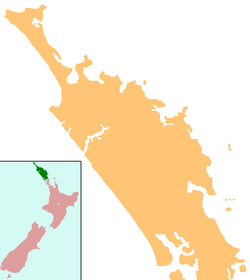Whirinaki, Northland
Whirinaki | |
|---|---|
| Coordinates: 35°28′26″S 173°27′45″E / 35.47389°S 173.46250°E | |
| Country | New Zealand |
| Region | Northland Region |
| District | Far North District |
| Population (c.2005) | |
• Total | 200 |
Whirinaki is a locality on the Whirinaki River in the south Hokianga, in Northland, New Zealand. The name means "to lean against a support".[1] Highway 12 runs through it. Opononi lies to the south west, and Rawene lies to the north east.[2][3]
It is part of the Hokianga South statistical area, which covers the southern side of Hokianga Harbour between Rawene and Koutu. For demographics of this area, see Rawene.
History and culture
Whirinaki was raided by Te Roroa in 1810 or 1811, during the Musket Wars. All the inhabitants of Opara village were killed.[4]
The area has three marae associated with Ngāpuhi hapū:[5]
- Mātai Aranui Marae are affiliated with Ngāti Kairewa, Ngāti Kerewheti, Ngāti Te Pou, Te Hikutu and Te Whānau Whero.
- Mōria Marae are affiliated with Ngāti Kairewa, Ngāti Kerewheti, Ngāti Te Pou, Ngāti Tuapango, Te Hikutu and Te Whānau Whero.
- Pā te Aroha Marae are affiliated with Ngāti Kairewa, Ngāti Kerewheti, Ngāti Te Pou, Ngāti Tuapango, Te Hikutu and Te Whānau Whero.[6]
Education

Te Kura Kaupapa Māori o Te Tonga o Hokianga is a coeducational full primary (years 1–8) school[7] which has a roll of 147. It is a Kura Kaupapa Māori school which teaches fully in the Māori language.
There was a Whirinaki Native School during the early-mid 20th century.[8]
35°28′26″S 173°27′45″E / 35.47389°S 173.46250°E
Notes
- ^ "Ngā Puhi - Ancestors". Te Ara: The Encyclopedia of New Zealand. Archived from the original on 12 February 2008. Retrieved 29 January 2008.
- ^ Peter Dowling, ed. (2004). Reed New Zealand Atlas. Reed Books. pp. map 6. ISBN 0-7900-0952-8.
- ^ Roger Smith, GeographX (2005). The Geographic Atlas of New Zealand. Robbie Burton. pp. map 22. ISBN 1-877333-20-4.
- ^ Smith, Stephenson Percy (1910). "Further Wars on the Border-Land". Maori Wars of the Nineteenth Century. p. 52. Archived from the original on 1 February 2023. Retrieved 1 February 2023.
- ^ "Māori Maps". maorimaps.com. Te Potiki National Trust. Archived from the original on 22 January 2019. Retrieved 25 February 2019.
- ^ "Te Kāhui Māngai directory". tkm.govt.nz. Te Puni Kōkiri. Archived from the original on 18 January 2020. Retrieved 25 February 2019.
- ^ Education Counts: Te Kura Kaupapa Maori o Te Tonga o Hokianga
- ^ Lange, Raeburn (1999). May the People Live: a history of Maori health development, 1900-1920. Auckland University Press. p. 76. ISBN 1869402146.

